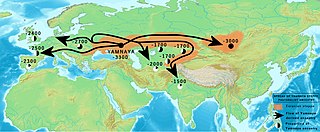Russia, or the Russian Federation, is a country spanning Eastern Europe and North Asia. It is the largest country in the world by area, extending across eleven time zones and sharing land borders with fourteen countries. It is the world’s ninth-most populous country and Europe’s most populous country.
The East Slavs emerged as a recognised group in Europe between the 3rd and 8th centuries CE. The first East Slavic state, Kievan Rus’, arose in the 9th century, and in 988, it adopted Orthodox Christianity from the Byzantine Empire. Kievan Rus’ ultimately disintegrated; the Grand Duchy of Moscow led the unification of Russian lands, leading to the proclamation of the Tsardom of Russia in 1547. By the early 18th century, Russia had vastly expanded through conquest, annexation, and the efforts of Russian explorers, developing into the Russian Empire, which remains the third-largest empire in history. However, with the Russian Revolution in 1917, Russia’s monarchic rule was abolished and eventually replaced by the Russian SFSR—the world’s first constitutionally socialist state. Following the Russian Civil War, the Russian SFSR established the Soviet Union with three other Soviet republics, within which it was the largest and principal constituent. At the expense of millions of lives, the Soviet Union underwent rapid industrialisation in the 1930s and later played a decisive role for the Allies in World War II by leading large-scale efforts on the Eastern Front. With the onset of the Cold War, it competed with the United States for ideological dominance and international influence. The Soviet era of the 20th century saw some of the most significant Russian technological achievements, including the first human-made satellite and the first human expedition into outer space.
In 1991, the Russian SFSR emerged from the dissolution of the Soviet Union as the Russian Federation. A new constitution was adopted, which established a federal semi-presidential system. Since the turn of the century, Russia’s political system has been dominated by Vladimir Putin, under whom the country has experienced democratic backsliding and a shift towards authoritarianism. Russia has been militarily involved in a number of conflicts in former Soviet states and other countries, including its war with Georgia in 2008 and its war with Ukraine since 2014, which has involved the internationally unrecognised annexations of Ukrainian territory including Crimea in 2014 and four other regions in 2022 during an ongoing invasion.
The first trace of an early modern human in Russia dates back to 45,000 years, in Western Siberia.[42] The discovery of high concentration cultural remains of anatomically modern humans, from at least 40,000 years ago, was found at Kostyonki–Borshchyovo,[43] and at Sungir, dating back to 34,600 years ago—both in western Russia.[44] Humans reached Arctic Russia at least 40,000 years ago, in Mamontovaya Kurya.[45] Ancient North Eurasian populations from Siberia genetically similar to Mal’ta–Buret’ culture and Afontova Gora were an important genetic contributor to Ancient Native Americans and Eastern Hunter-Gatherers.[46]

The Kurgan hypothesis places the Volga-Dnieper region of southern Russia and Ukraine as the urheimat of the Proto-Indo-Europeans.[48] Early Indo-European migrations from the Pontic–Caspian steppe of Ukraine and Russia spread Yamnaya ancestry and Indo-European languages across large parts of Eurasia.[49][50] Nomadic pastoralism developed in the Pontic–Caspian steppe beginning in the Chalcolithic.[51] Remnants of these steppe civilizations were discovered in places such as Ipatovo,[51] Sintashta,[52] Arkaim,[53] and Pazyryk,[54] which bear the earliest known traces of horses in warfare.[52] The genetic makeup of speakers of the Uralic language family in northern Europe was shaped by migration from Siberia that began at least 3,500 years ago.[55]
In the 3rd to 4th centuries CE, the Gothic kingdom of Oium existed in southern Russia, which was later overrun by Huns. Between the 3rd and 6th centuries CE, the Bosporan Kingdom, which was a Hellenistic polity that succeeded the Greek colonies,[56] was also overwhelmed by nomadic invasions led by warlike tribes such as the Huns and Eurasian Avars.[57] The Khazars, who were of Turkic origin, ruled the steppes between the Caucasus in the south, to the east past the Volga river basin, and west as far as Kyiv on the Dnieper river until the 10th century.[58] After them came the Pechenegs who created a large confederacy, which was subsequently taken over by the Cumans and the Kipchaks.[59]
The ancestors of Russians are among the Slavic tribes that separated from the Proto-Indo-Europeans, who appeared in the northeastern part of Europe c. 1500 years ago.[60] The East Slavs gradually settled western Russia (approximately between modern Moscow and Saint-Petersburg) in two waves: one moving from Kiev towards present-day Suzdal and Murom and another from Polotsk towards Novgorod and Rostov.[61] Prior to Slavic migration, that territory was populated by Finno-Ugrian peoples. From the 7th century onwards, the incoming East Slavs slowly assimilated the native Finno-Ugrians.







